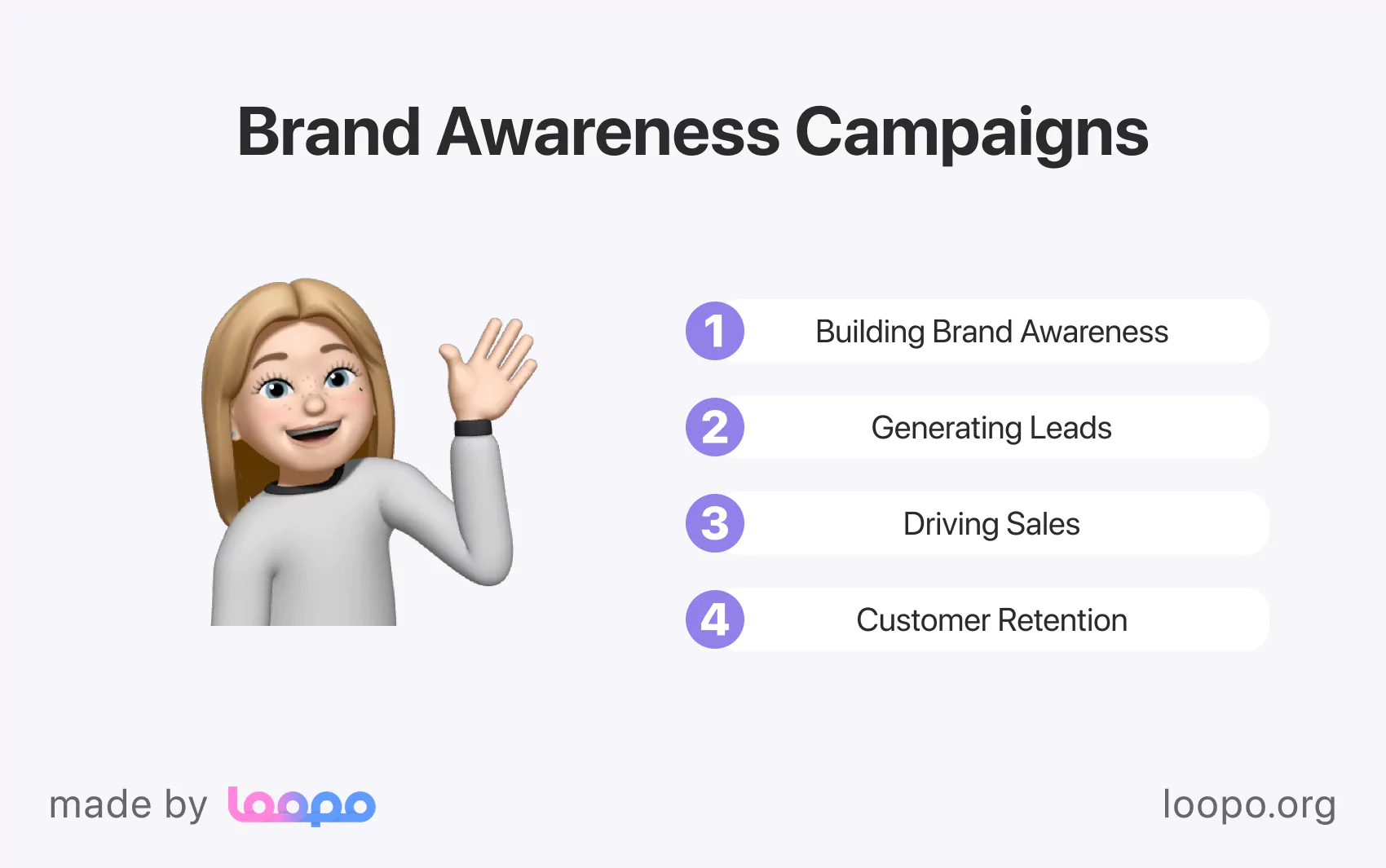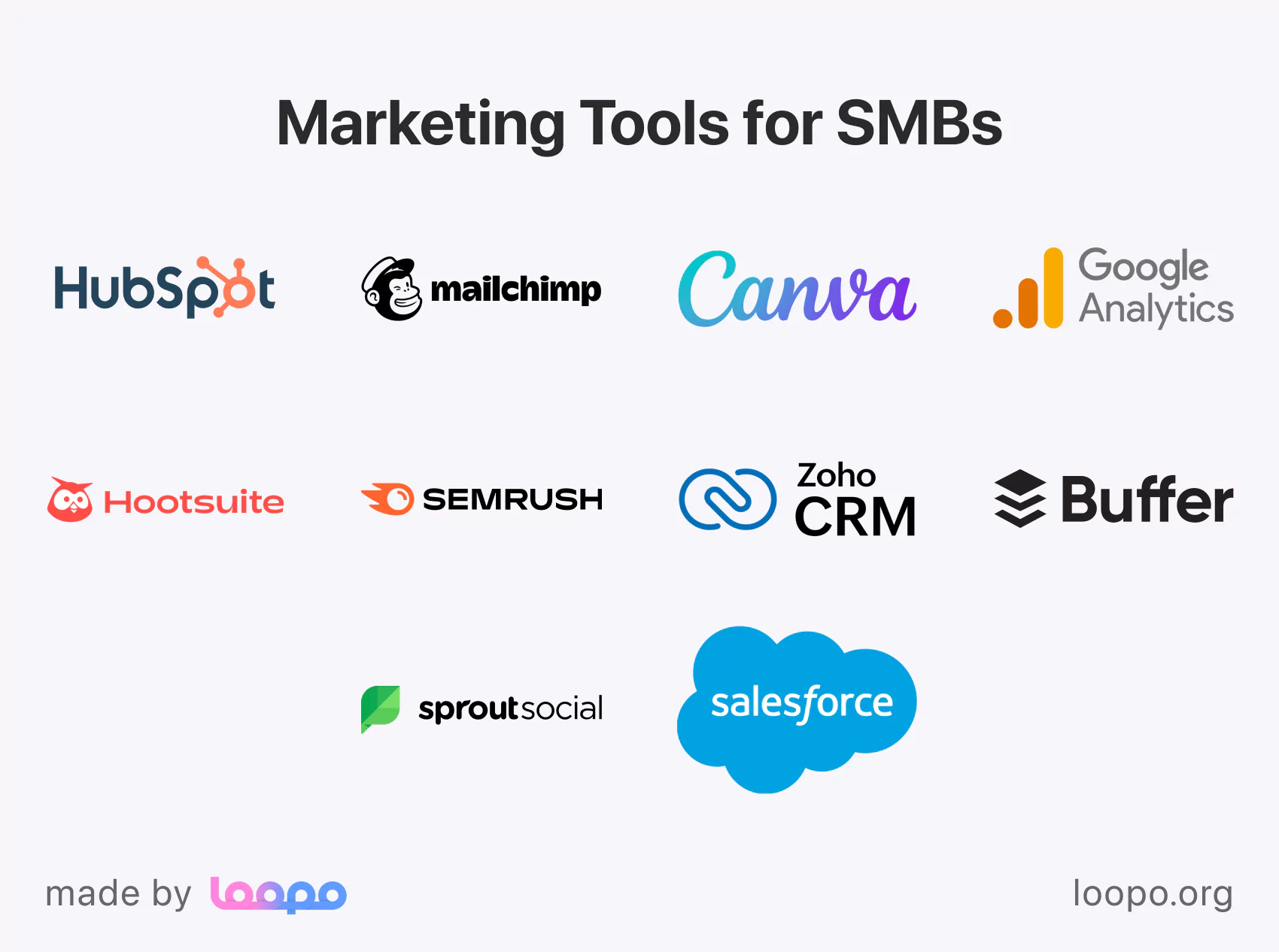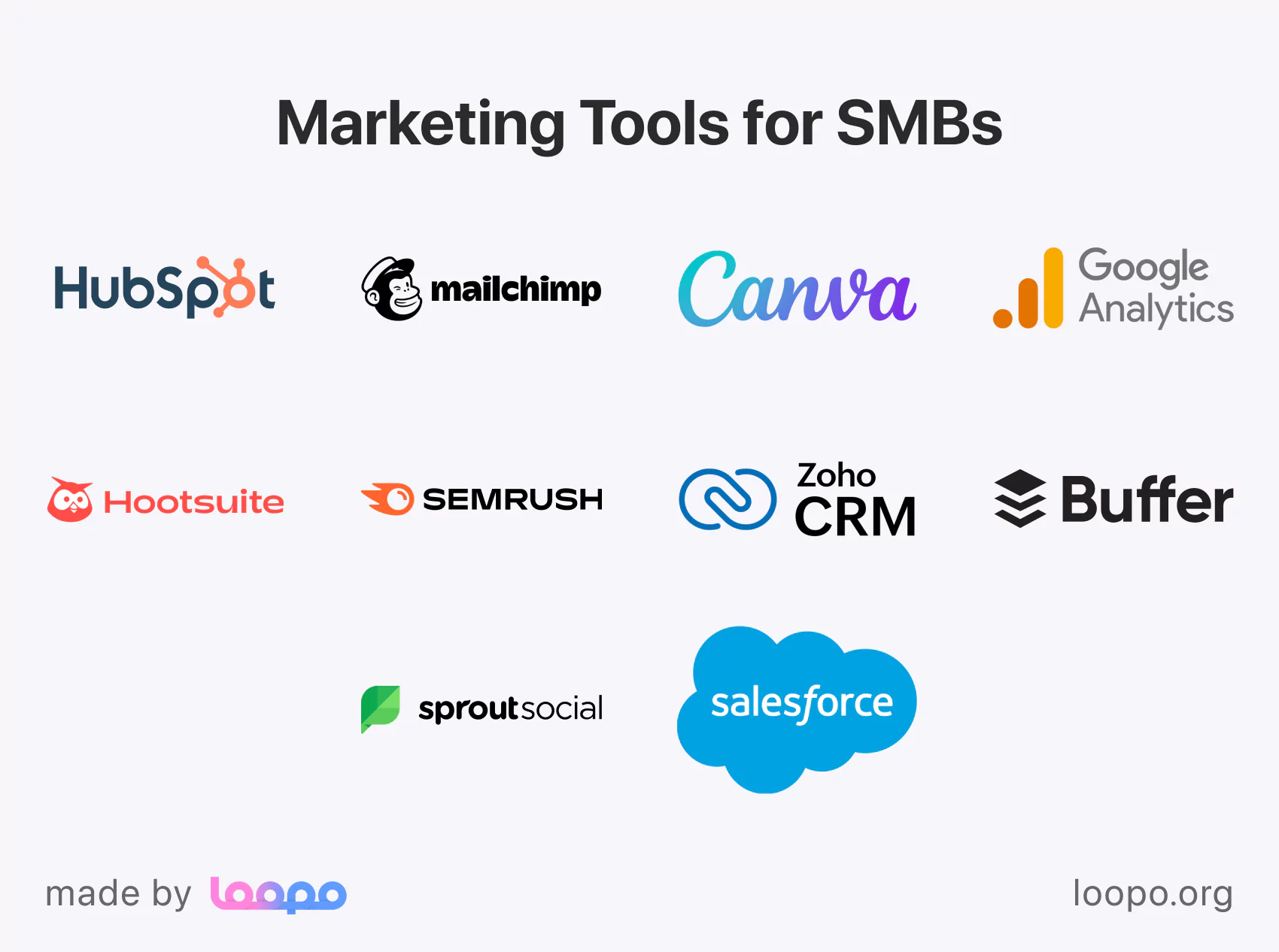SMB Marketing Made Simple: Strategies That Work

In today’s competitive marketplace, small and medium-sized businesses (SMBs) face unique challenges when it comes to marketing. Limited budgets, resources, and time can make it difficult to implement effective marketing strategies. However, with the right approach and the use of digital marketing for small businesses, SMBs can not only compete but thrive. This comprehensive guide explores proven strategies, essential marketing tools for small businesses, and actionable tips to simplify SMB marketing and drive growth.

Understanding Small Business Marketing
What is Small Business Marketing?
Small business marketing involves the strategies and tactics that small and medium-sized businesses use to promote their products or services to their target audience. Unlike larger corporations, SMBs often rely on more personalized and cost-effective marketing solutions to reach potential customers and build brand loyalty.
Importance of Marketing for SMBs
Marketing is crucial for SMBs as it helps in:
Building Brand Awareness: Introducing your business to potential customers.
Generating Leads: Attracting prospects who are interested in your offerings.
Driving Sales: Converting leads into paying customers.
Customer Retention: Keeping existing customers engaged and loyal.

Key Strategies for Effective SMB Marketing
1. Considering Digital Marketing for Small Businesses
Digital marketing is a cornerstone of modern SMB marketing. It encompasses various online strategies that help businesses reach a wider audience, engage with customers, and drive sales. Key components include:
Search Engine Optimization (SEO)
Optimizing your website to rank higher on search engine results pages (SERPs) increases visibility and drives organic traffic. Focus on:
Keyword Research: Identify relevant keywords like small business marketing and digital marketing for small business.
On-Page SEO: Optimize titles, meta descriptions, headers, and content.
Link Building: Acquire backlinks from reputable websites.
Social Media Marketing
Engage with your audience on platforms like Facebook, Instagram, LinkedIn, and Twitter. Strategies include:
Content Creation: Share valuable content that resonates with your audience.
Advertising: Use targeted ads to reach specific demographics.
Engagement: Respond to comments and messages promptly.
Email Marketing
Build and maintain relationships with your customers through personalized email campaigns. Tips:
Segmentation: Divide your email list based on customer behavior and preferences.
Automation: Use email marketing software to automate campaigns.
Content: Provide valuable information, promotions, and updates.
2. Utilizing Marketing Tools for Small Business
Leveraging the right marketing tools can streamline your efforts and enhance efficiency. Here are some essential tools:
Customer Relationship Management (CRM) Software
Manage interactions with current and potential customers. Popular options include:
Salesforce: Comprehensive CRM with extensive features.
HubSpot: User-friendly CRM with marketing automation capabilities.
Zoho CRM: Affordable option for small businesses.
Social Media Management Tools
Simplify social media marketing with tools like:
Hootsuite: Schedule posts and monitor social media activity.
Buffer: Plan and publish content across multiple platforms.
Sprout Social: Advanced analytics and social listening features.
Analytics Tools
Track and analyze your marketing performance using:
Google Analytics: Free tool for website traffic analysis.
Semrush: Comprehensive SEO and competitive analysis.
Hotjar: Understand user behavior through heatmaps and recordings.

3. Developing a Strong Online Presence
A robust online presence is vital for SMBs to reach and engage with their target audience. Key elements include:
Professional Website
Your website is often the first impression potential customers have of your business. Ensure it is:
Mobile-Friendly: Optimize for mobile devices.
Fast Loading: Improve site speed to enhance user experience.
User-Friendly Navigation: Make it easy for visitors to find information.
Content Marketing
Create valuable and relevant content to attract and engage your audience. Strategies include:
Blogging: Share industry insights, tips, and company news.
Video Content: Use videos to demonstrate products, share testimonials, or provide tutorials.
Infographics: Present complex information in a visually appealing format.
Local SEO
Optimize your online presence for local searches to attract customers in your area. Focus on:
Google My Business: Create and optimize your listing.
Local Keywords: Incorporate location-specific keywords.
Customer Reviews: Encourage satisfied customers to leave positive reviews.
4. Leveraging AI for Small Business Marketing
Artificial Intelligence (AI) is transforming the way SMBs approach marketing. AI tools can automate tasks, provide insights, and enhance personalization. Examples include:
Chatbots: Provide instant customer support and engage visitors on your website.
Predictive Analytics: Forecast trends and customer behavior.
Personalized Recommendations: Tailor product suggestions based on user data.
5. Implementing Cost-Effective Marketing Strategies
SMBs often operate with limited budgets, making cost-effective marketing strategies essential. Consider the following approaches:
Content Marketing
Creating high-quality content is relatively low-cost and can yield significant returns. Focus on:
Blog Posts: Regularly publish informative articles.
Guest Blogging: Contribute to other websites to reach a broader audience.
User-Generated Content: Encourage customers to create and share content related to your brand.
Influencer Marketing
Collaborate with influencers who resonate with your target audience. Steps to implement:
Identify Relevant Influencers: Choose influencers whose followers match your target demographic.
Build Relationships: Engage with influencers authentically.
Measure Impact: Track the performance of influencer campaigns.
Referral Programs
Encourage existing customers to refer new clients by offering incentives. Benefits include:
Cost-Effective: Lower cost compared to traditional advertising.
High Trust: Referrals come from trusted sources, increasing conversion rates.
6. Measuring and Analyzing Marketing Performance
To ensure your marketing efforts are effective, it's crucial to measure and analyze performance regularly. Key metrics to track:
Website Traffic: Monitor the number of visitors and their behavior.
Conversion Rates: Measure the percentage of visitors who take desired actions.
Return on Investment (ROI): Calculate the profitability of your marketing campaigns.
Customer Acquisition Cost (CAC): Determine the cost of acquiring a new customer.
Use analytics tools to gather data and make informed decisions to optimize your strategies.
Top Marketing Tools and Software for Small Businesses
Selecting the right marketing tools can significantly enhance your marketing efforts. Here are some of the best marketing software for small businesses:
1. HubSpot
HubSpot offers a comprehensive suite of marketing tools, including CRM, email marketing, social media management, and analytics. Its user-friendly interface makes it ideal for small businesses looking to streamline their marketing processes.
2. Mailchimp
Mailchimp is a popular email marketing tool that allows businesses to create, send, and analyze email campaigns. It also offers marketing automation features and integrates with various other platforms.
3. Canva
Canva is a graphic design tool that enables small businesses to create professional-quality visuals for their marketing campaigns. It offers a wide range of templates and easy-to-use design tools.
4. Google Analytics
Google Analytics is a free tool that provides in-depth insights into website traffic and user behavior. It helps businesses understand how visitors interact with their site and identify areas for improvement.
5. Hootsuite
Hootsuite is a social media management platform that allows businesses to schedule posts, monitor social media activity, and analyze performance across multiple channels.
6. Semrush
Semrush is an SEO and competitive analysis tool that helps businesses improve their search engine rankings and understand their competitors’ strategies.
7. Zoho CRM
Zoho CRM is a cost-effective customer relationship management tool that helps businesses manage their sales, marketing, and customer support in one platform.
8. Buffer
Buffer is a social media management tool that allows businesses to schedule posts, track engagement, and analyze performance across various social media platforms.
9. Sprout Social
Sprout Social offers advanced social media management features, including scheduling, monitoring, and analytics, making it easier for small businesses to manage their online presence.
10. Salesforce
Salesforce is a robust CRM platform that provides a wide range of marketing, sales, and customer service tools, suitable for growing small businesses.

Creating a Small Business Marketing Plan
A well-structured marketing plan is essential for guiding your marketing efforts and achieving your business goals. Here’s how to create an effective marketing plan for your SMB:
1. Define Your Goals
Start by outlining your marketing objectives. Common goals include:
Increasing Brand Awareness: Making more people aware of your business.
Generating Leads: Attracting potential customers interested in your offerings.
Boosting Sales: Converting leads into paying customers.
Enhancing Customer Loyalty: Retaining existing customers and encouraging repeat business.
2. Identify Your Target Audience
Understanding your target audience is crucial for creating relevant and effective marketing campaigns. Consider factors such as:
Demographics: Age, gender, income, education, etc.
Psychographics: Interests, values, lifestyle, etc.
Behavioral Traits: Buying habits, brand loyalty, etc.
3. Conduct a SWOT Analysis
Analyze your business’s strengths, weaknesses, opportunities, and threats (SWOT) to identify areas where you can leverage your strengths and address your weaknesses.
4. Choose Your Marketing Channels
Select the marketing channels that are most effective for reaching your target audience. Common channels include:
Social Media: Facebook, Instagram, LinkedIn, Twitter, etc.
Email Marketing: Newsletters, promotional emails, etc.
Content Marketing: Blogs, videos, infographics, etc.
Search Engine Marketing (SEM): PPC advertising, SEO, etc.
5. Develop Your Marketing Strategies
Outline the specific strategies you will use to achieve your marketing goals. For example:
Content Marketing Strategy
Publish weekly blog posts and monthly videos to engage your audience.
Social Media Strategy
Post daily on Instagram and Facebook, and run monthly ad campaigns.
Email Marketing Strategy
Send bi-weekly newsletters and promotional emails to your subscriber list.
6. Set Your Budget
Determine how much you are willing to spend on your marketing efforts. Allocate your budget across different channels and strategies based on their potential ROI.
7. Implement and Monitor
Execute your marketing plan and monitor its performance regularly. Use analytics tools to track key metrics and make adjustments as needed to optimize your strategies.
8. Evaluate and Adjust
Periodically review your marketing plan to assess its effectiveness. Make necessary changes based on your performance data and evolving business goals.
Best Marketing Platforms for Small Businesses
Choosing the right marketing platforms is essential for maximizing your reach and engagement. Here are some of the best marketing platforms for small businesses:
1. Facebook
With over 2.8 billion monthly active users, Facebook is a powerful platform for reaching a diverse audience. It offers various advertising options, including targeted ads, video ads, and carousel ads.
2. Instagram
Instagram is ideal for businesses with visually appealing products or services. Utilize features like Stories, IGTV, and shoppable posts to engage with your audience.
3. LinkedIn
LinkedIn is a valuable platform for B2B marketing. It allows you to connect with professionals, share industry insights, and run targeted ads.
4. Twitter
Twitter is great for real-time engagement and sharing quick updates. Use hashtags and participate in relevant conversations to increase your visibility.
5. Google Ads
Google Ads enables you to display ads on Google’s search engine and its network of partner sites. It’s effective for driving targeted traffic to your website.
6. YouTube
YouTube is the second largest search engine and a powerful platform for video marketing. Create engaging video content to reach a wide audience.
7. Pinterest
Pinterest is ideal for businesses in niches like fashion, home decor, and DIY. Use visually appealing pins to drive traffic to your website.
8. TikTok
TikTok is rapidly growing and popular among younger audiences. Create short, engaging videos to increase brand awareness and reach new customers.
9. Email Marketing Platforms
Platforms like Mailchimp, Constant Contact, and SendinBlue offer robust email marketing features to help you manage your campaigns effectively.
10. Content Management Systems (CMS)
WordPress, Wix, and Squarespace are popular CMS platforms that make it easy to create and manage your website content.

Innovative Small Business Marketing Ideas and Tips
To stand out in a crowded market, SMBs need to adopt innovative marketing ideas and tips. Here are some creative approaches to consider:
1. Storytelling
Share your brand’s story to connect with your audience on an emotional level. Highlight your journey, values, and the mission behind your business.
2. Interactive Content
Engage your audience with interactive content such as quizzes, polls, and surveys. This not only boosts engagement but also provides valuable insights into your customers’ preferences.
3. Video Marketing
Videos are highly engaging and can effectively convey your message. Create product demos, customer testimonials, and educational videos to attract and retain customers.
4. Influencer Partnerships
Collaborate with influencers who align with your brand to reach a wider audience. Influencers can provide authentic endorsements that resonate with their followers.
5. User-Generated Content
Encourage your customers to create and share content related to your brand. This can include reviews, photos, and videos, which can be featured on your website and social media channels.
6. Local Sponsorships and Events
Participate in local events or sponsor community activities to increase your brand’s visibility and build strong relationships within your community.
7. Personalized Marketing
Use data and analytics to personalize your marketing efforts. Tailored messages and offers can significantly improve customer engagement and conversion rates.
8. SEO and Content Optimization
Continuously optimize your content for search engines to maintain high rankings and attract organic traffic. Focus on both on-page and off-page SEO strategies.
9. Email Segmentation
Segment your email list based on customer behavior and preferences to deliver more relevant and targeted campaigns, increasing the likelihood of conversions.
10. Loyalty Programs
Implement loyalty programs to reward repeat customers and encourage long-term relationships. Offer discounts, exclusive offers, or points-based systems to incentivize loyalty.
Leveraging Digital Marketing Software for Small Businesses
Digital marketing software can enhance your marketing efforts by automating tasks, providing valuable insights, and improving efficiency. Here are some ways to leverage digital marketing software:
1. Marketing Automation
Automate repetitive tasks such as email campaigns, social media posting, and lead nurturing. This saves time and ensures consistency in your marketing efforts.
2. Data Analytics
Use analytics software to track and analyze your marketing performance. Gain insights into customer behavior, campaign effectiveness, and ROI to make informed decisions.
3. Customer Segmentation
Segment your audience based on various criteria such as demographics, behavior, and preferences. This allows for more targeted and personalized marketing campaigns.
4. A/B Testing
Conduct A/B testing on your marketing campaigns to identify what works best. Test different headlines, images, and calls to action to optimize your strategies.
5. Content Management
Manage and organize your content efficiently with content management software. Ensure that your website and marketing materials are up-to-date and consistent.
6. Social Media Scheduling
Schedule your social media posts in advance to maintain a consistent online presence. Use scheduling tools to plan your content calendar and streamline your social media strategy.
7. CRM Integration
Integrate your CRM software with your marketing tools to have a unified view of your customer interactions. This enhances your ability to manage relationships and personalize your marketing efforts.
8. SEO Tools
Utilize SEO tools to optimize your website and content for search engines. Identify keyword opportunities, monitor your rankings, and analyze your competitors.
9. Email Marketing Software
Use email marketing software to design, send, and track your email campaigns. Benefit from features like automation, segmentation, and detailed analytics.
10. Project Management
Implement project management software to organize your marketing projects, collaborate with your team, and ensure timely execution of your campaigns.
Choosing the Right Small Business Marketing Services
Outsourcing certain marketing tasks can be beneficial for SMBs, allowing you to focus on core business activities. Here are some considerations when choosing small business marketing services:
1. Define Your Needs
Identify the specific marketing tasks you need help with, such as SEO, social media management, content creation, or PPC (pay per click) advertising.
2. Evaluate Expertise
Look for agencies or service providers with expertise in your industry and the specific marketing services you require. Check their portfolio and client testimonials.
3. Consider Budget
Ensure that the marketing services fit within your budget. Compare pricing models and determine the best value for your investment.
4. Assess Communication
Choose a service provider that communicates effectively and understands your business goals. Clear and consistent communication is essential for a successful partnership.
5. Review Performance Metrics
Ensure that the service provider uses measurable metrics to track and report on the performance of your marketing campaigns. This allows you to assess the effectiveness of their efforts.
6. Seek Flexibility
Opt for a marketing service that can adapt to your changing needs and scale as your business grows. Flexibility is crucial for long-term success.
7. Request a Proposal
Ask for a detailed proposal outlining the services offered, strategies to be implemented, and expected outcomes. This helps you make an informed decision.
Integrating AI into Your Marketing Strategy
Artificial Intelligence (AI) is revolutionizing the marketing landscape, offering SMBs innovative ways to enhance their marketing efforts. By leveraging AI for small business marketing, you can gain valuable insights, automate tasks, and deliver personalized experiences to your customers.
AI-Powered Analytics
AI-driven analytics tools can process vast amounts of data quickly, providing actionable insights into customer behavior, market trends, and campaign performance. This allows SMBs to make data-driven decisions and optimize their marketing strategies for better results.
Personalized Customer Experiences
AI enables businesses to deliver highly personalized experiences to their customers. By analyzing customer data, AI can recommend products, tailor content, and customize communication to meet individual preferences, enhancing customer satisfaction and loyalty.
Chatbots and Customer Support
Implementing AI-powered chatbots can improve customer support by providing instant responses to inquiries, handling routine tasks, and freeing up your team to focus on more complex issues. Chatbots enhance the customer experience by offering 24/7 support and quick resolution of common problems.
Predictive Marketing
AI can predict future trends and customer behavior based on historical data. This allows SMBs to anticipate customer needs, adjust their marketing strategies proactively, and stay ahead of the competition.
Content Generation
AI tools can assist in content creation by generating ideas, drafting articles, and even creating visuals. This streamlines the content marketing process, saving time and resources while maintaining high-quality output.
Automated Advertising
AI can optimize advertising campaigns by analyzing performance data and making real-time adjustments to targeting, bidding, and ad placements. This ensures that your advertising budget is used efficiently, maximizing ROI.
Voice Search Optimization
With the rise of voice-activated devices, optimizing your content for voice search is becoming increasingly important. AI can help analyze voice search trends and adapt your SEO strategies to capture this growing segment of search traffic.
Social Media Insights
AI tools can monitor social media platforms to gather insights into customer sentiment, emerging trends, and competitor activities. This information can inform your social media strategy, helping you create more relevant and engaging content.
Email Marketing Optimization
AI can enhance email marketing by personalizing content, optimizing send times, and segmenting audiences based on behavior. This leads to higher open rates, click-through rates, and overall campaign effectiveness.
Image and Video Recognition
AI-powered image and video recognition can enhance your marketing efforts by analyzing visual content for trends, brand mentions, and customer engagement. This provides deeper insights into how your visual content is performing and how it can be improved.
Best Practices for Implementing SMB Marketing Solutions
To maximize the effectiveness of your marketing strategies, it’s essential to follow best practices tailored to small businesses. Here are some key guidelines:
1. Understand Your Audience
Deeply understanding your target audience is the foundation of effective marketing. Conduct market research to identify your customers’ needs, preferences, and pain points. Use this information to tailor your marketing messages and strategies accordingly.
2. Set Clear Objectives
Establish clear, measurable objectives for your marketing efforts. Whether it’s increasing website traffic, generating leads, or boosting sales, having specific goals helps you stay focused and track your progress.
3. Create High-Quality Content
Content is a powerful tool for engaging your audience and establishing your authority in your industry. Invest in creating high-quality, valuable content that addresses your audience’s needs and interests. This includes blog posts, videos, infographics, and more.
4. Optimize for Mobile
With the majority of internet users accessing content via mobile devices, ensuring that your website and marketing materials are mobile-friendly is crucial. A responsive design and fast-loading pages enhance the user experience and improve your search engine rankings.
5. Leverage Social Proof
Social proof, such as customer reviews, testimonials, and case studies, can significantly influence potential customers. Highlight positive feedback and showcase success stories to build trust and credibility.
6. Focus on Customer Experience
Providing an excellent customer experience is key to retaining customers and encouraging word-of-mouth referrals. Ensure that every touchpoint, from your website to customer support, is seamless and user-friendly.
7. Monitor and Adjust
Regularly monitor the performance of your marketing campaigns using analytics tools. Analyze the data to identify what’s working and what’s not, and make necessary adjustments to optimize your strategies for better results.
8. Stay Updated with Trends
The marketing landscape is constantly evolving. Stay informed about the latest trends, tools, and best practices to keep your marketing efforts current and effective.
9. Invest in Training
Equip yourself and your team with the necessary skills and knowledge to execute your marketing strategies effectively. Invest in training and professional development to stay ahead in the competitive market.
10. Collaborate and Network
Build relationships with other businesses, industry influencers, and your customers. Collaboration and networking can lead to valuable partnerships, referrals, and new opportunities for growth.
Conclusion
SMB marketing doesn't have to be overwhelming. By implementing the right strategies, leveraging essential marketing tools, and staying adaptable to industry trends, small and medium-sized businesses can achieve significant growth and success. From digital marketing for small businesses to utilizing AI and innovative marketing ideas, the possibilities are endless.
Remember to continuously monitor your efforts, adjust your strategies based on data-driven insights, and stay committed to delivering value to your customers. With dedication and the right approach, SMBs can effectively navigate the marketing landscape and build a strong, sustainable presence in their respective markets.
Visit our blog for actionable tips, and connect with us to craft the ideal solution for your unique needs!



